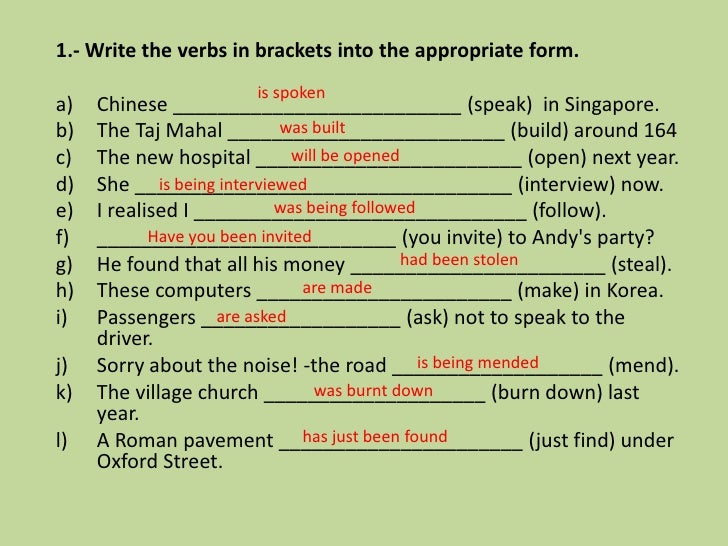Active And Passive Sentences Quiz
Identify each of the following sentences as active or passive. Read the following sentences and state whether they are in the active voice or passive voice. The cat killed the mouse. She recognized him at once. Active and Passive Voice Quiz. Test your understanding of active and passive verb forms with this interactive. Since there is no object in this sentence.
Introduction When a reader reads a sentence, he/she (consciously or subconsciously) tries to figure out who is doing what in the sentence in order to determine meaning. Essentially, this provides the reader with the knowledge of who the subject is and what is the subject doing (verb) or how the subject is in a state of being.
When the subject and verb of a sentence construction are not clear, it creates confusion for the reader and slows down the process of both reading and comprehension. If you've ever sensed that teachers and grammarians look down on the passive sentence (also known as ), it is because of this confusion. There are times, however, when passive voice functions even more effectively in a sentence than active voice. Let's discuss structure and see some examples in order to evaluate different sentence situations and determine which option is the best. Structure Grammarians will often call the subject the actor of the sentence because a noun (a person, place, thing, or idea) initiates the action of the sentence. A writer creates passive voice in one of two ways: 1) In the order of the sentence structure, the verb appears before the actor.
2) The writer has removed the actor completely from the structure of the sentence. Example of #1 Passive: The decision to enact capital punishment was made by the judge.
Active: The judge decided to enact capital punishment. The 'judge' in this example is the actor; we create clearer, more assertive sentence structure when we move 'the judge' to the beginning of the sentence where he can precede the verb 'decided.' Example of #2 Passive: All of the pulp was squeezed out of the orange juice.
Active: My mother squeezed all of the pulp from the orange juice. In this example, the writer has omitted the actor of 'mother' completely. When we add the subject back into the sentence, who is doing what is much clearer. Occasions for Passive Voice There are circumstances when a writer will retain passive voice, but as a general rule of thumb, skilled writers usually use more active constructions than passive constructions. Let's take a look at the situations where passive voice is appropriate: 1) The actor is unknown Example: Over ten million people were killed in Belgium's colonization of the Congo.
From historical accounts, there are several European leaders and other parties who had a hand in the colonization of the Congo. This is a situation where it's difficult to pinpoint only one actor, so it's then an acceptable example of where passive voice could be appropriate. 2) When the emphasis of the sentence is on something other than the actor. Example: C.S. Tick Picker V.1 In Binary.com here.

Lewis, Aldous Huxley, and Kennedy were surprised by death on the exact same day. We can see that the actor is 'death,' so there is the potential to make this an active sentence: 'Death surprised C.S.
Lewis, Aldous Huxley, and Kennedy on the exact same day.' However, I've crafted a sentence where I want the emphasis to be on the strange coincidence that these famous men died on the same day; therefore, as a writer, I choose to keep the passive voice to emphasize who was surprised, rather than what did the surprising.
3) In scientific writing where the emphasis is more on processes than people Example: The atoms will be split, thus creating fission. In scientific writing, researchers desire to capture processes, which almost always have multiple steps, variables, causes, effects, and so on. It can be difficult then to pinpoint a truly clear actor for a sentence. In the example above, we might be tempted to make this switch: 'Fission splits atoms.' However, this confuses a cause/effect relationship - is the atom-splitting causing the fission, or is the fission doing the action and splitting the atoms?
In this case, it is that the atoms' splitting will cause the reaction of fission. Because of cause/effect, variables, and so on, many researchers will opt to use passive voice for some situations. 4) With figurative language, such as similes and metaphors Example: Her face is a flower that only opens at night, showing me its true self. Technically, any being verb (am, is, was, were, be, being, been) is an instance of passive voice.